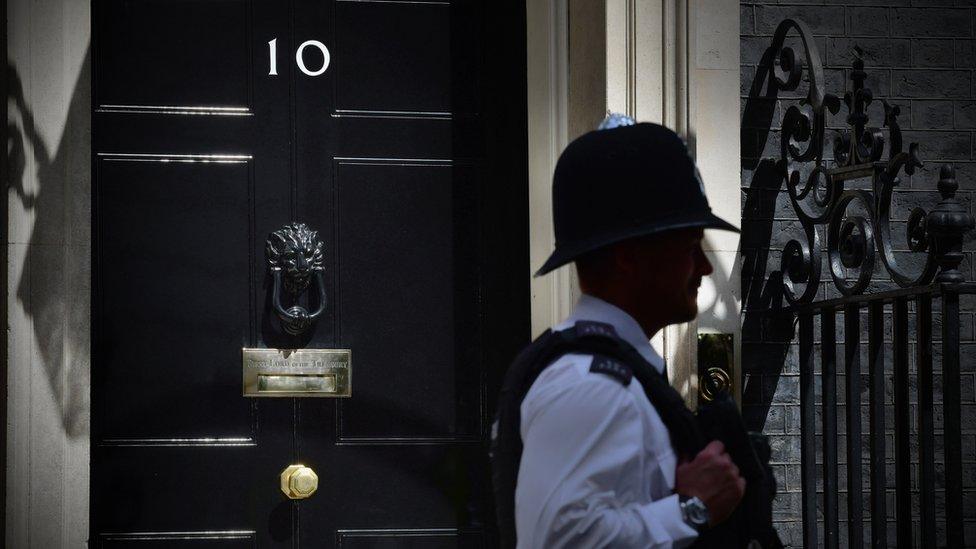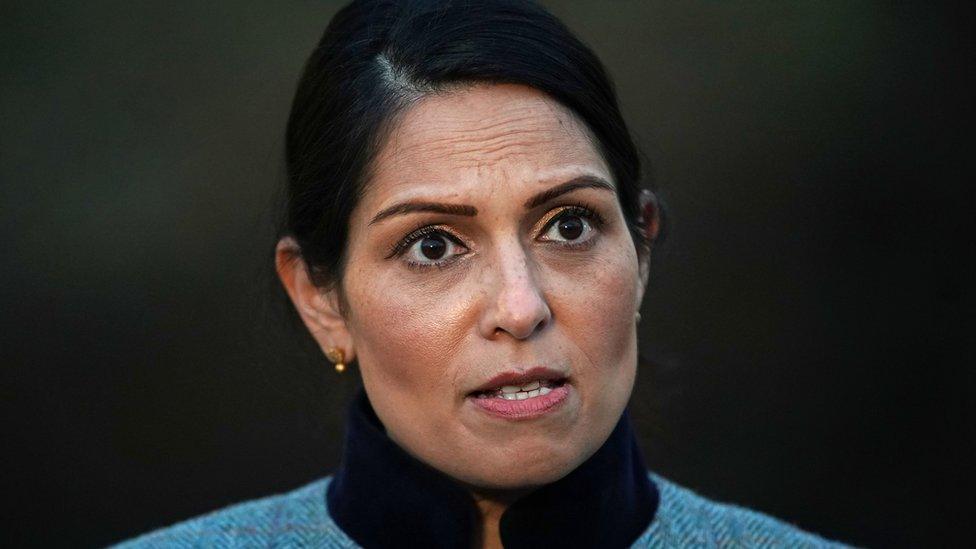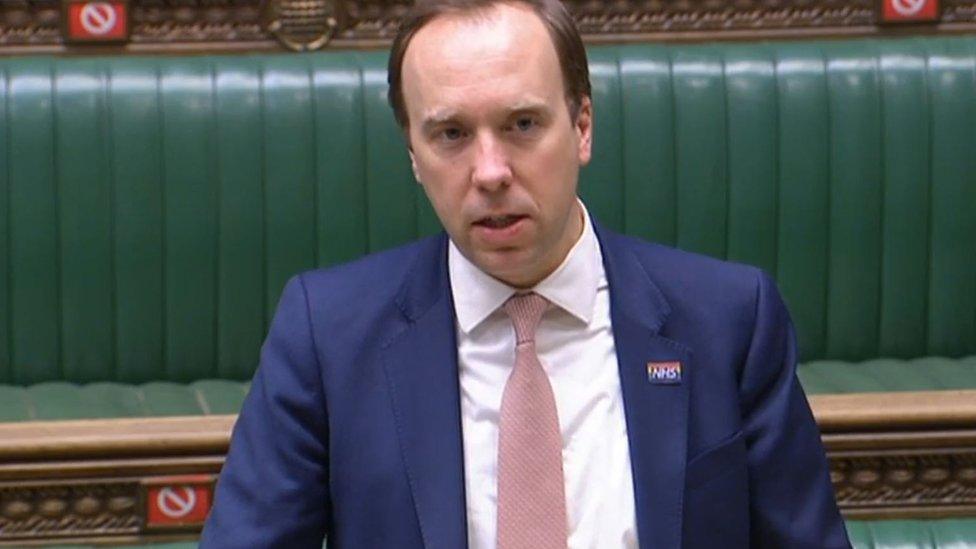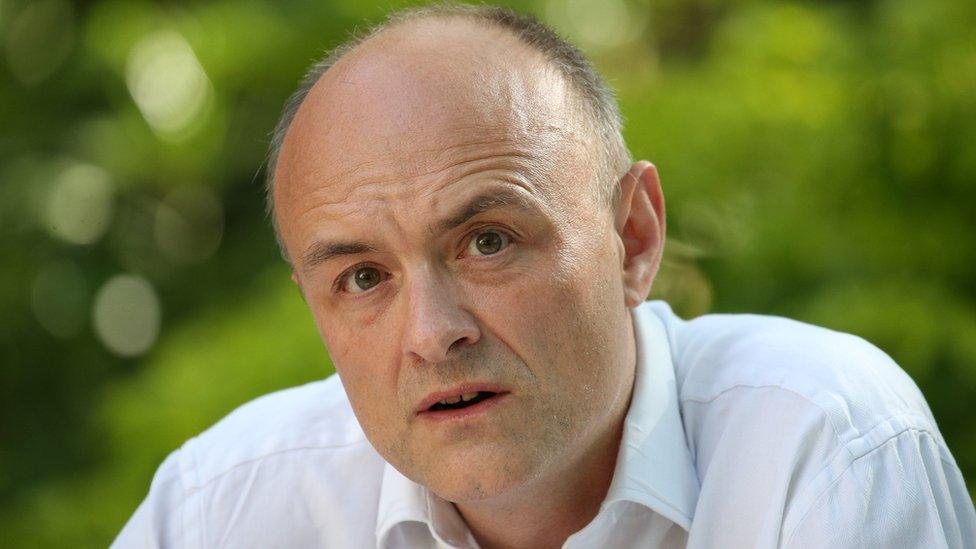The week ahead in Parliament
- Published

After a couple of weeks dominated by the Budget and the economy, next week sees crime and punishment, along with international grand strategy, take centre stage in Parliament.
Monday and Tuesday will see MPs sink their collective teeth into a massive new law and order bill.
Meanwhile, the prime minister is expected to deliver a statement unveiling the findings of the government's Integrated Review of Security, Defence, Foreign Policy and Development - an all-singing, all-dancing rethink of the way the UK engages with the world, after Brexit.
It will pave the way for what seems likely to be a highly controversial reshaping of the armed forces in a defence review, which will be published towards the end of the month.
A little normality has returned to Commons life, with the reinstatement of sitting Fridays and Westminster Hall debates, but I'm told there is some dispute over whether to keep some aspects of the Covid Commons' procedures, even after the pandemic.
Some MPs want to keep the card voting system, which replaced the use of crowded voting lobbies, and some want to maintain the time limits on speeches and the opportunities for participating virtually.
At some point those debates may be fought out in public, not least because the possibilities offered by virtual participation may provide an escape route from the massive expense of providing an alternative chamber - if the restoration of the Victorian Palace of Westminster means they eventually have to vacate their usual premises.
Another theme to keep an eye on is that some of the more heavy metal veteran MPs are starting to ask awkward questions when ministers present orders and regulations to the Commons.
Messrs Loughton, Harper, Speller and Hillier seem to be discomforting some ministers who've come under-prepared, to what they expected to be a rubber-stamping exercise.
Here's my rundown of the week ahead:
Monday 15 March
The Commons opens at 14:30 GMT for defence questions, with 15:30 prime time for any post-weekend ministerial statements or urgent questions.
The main event is the Second Reading debate for the legislative behemoth that is the Police, Crime, Sentencing and Courts Bill - a Home Office and Ministry of Justice co-production that has 176 clauses and 17 schedules.
So wide-ranging is the bill - it covers issues like desecration of war memorials, unauthorised traveller encampments, the proposals from the MoJ Sentencing White Paper, including creating a new species of "problem solving courts" to deal with addicts and others, plus management of sex-offenders and terrorist offenders - that the government business managers have taken the unusual step of having a two-day Second Reading debate.
Probably, there will be one day for the Home Office sections of the bill and one for the MoJ sections - allowing Home Secretary Priti Patel and Justice Secretary Robert Buckland to joust with their opposite numbers Nick Thomas Symonds and David Lammy.
Labour are miffed because the government has not stuck to the usual convention of leaving two weeks between the publication of a bill (the First Reading) and the initial debate (the Second Reading) - especially when this bill is such a monster.
They suspect the urgency is to provide some law and order red meat in the run-up to the major set of elections in May.

Home Secretary Priti Patel is expected to make an appearance at the dispatch box
In Westminster Hall at 16:30, there is a debate on e-petition 569957 on vaccine passports, which states: "We want the government to commit to not rolling out any e-vaccination status/immunity passport to the British public. Such passports could be used to restrict the rights of people who have refused a Covid-19 vaccine, which would be unacceptable."
The second debate at 18:15 is on a series of e-petitions around the impact of the pandemic on education - calling for the cancellation of all standardised testing for year 11 and year 12 students - replacing tests with course work and teacher assessment - not sending students back until priority groups are vaccinated, and closing schools in Tier 4 areas.
On the Committee Corridor, Public Accounts has a session at 14:30 on the impact of the pandemic on local authority finances - the extra demands it has created, and the impact on revenue, where many councils rely on the income from parking or even from local airports.
Some have taken to borrowing ("capitalising") to cover their spending gap, and a number have run up alarming levels of debt.
This session will be followed by another on Thursday, with officials from the Ministry of Housing, Communities and Local Government.

Councils have been especially strapped for cash during the pandemic
In the Lords at 13:00, ministers face questions about the impact of the pandemic on the BAME community, the impact of the Northern Ireland Protocol, and self-harm among women prisoners.
Then peers debate a couple of recommendations from their procedure committee on internal issues - to cap the number of balloted private members bills (those which qualify for some debating time) at 25 per parliamentary session.
Apparently the numbers have been creeping upwards, and 84 bills were proposed at the start of the current session.
Secondly, they want to put in place a question time for the government's Brexit supremo, Lord Frost - following the precedent set when Lord Mandelson and Lord Adonis were cabinet ministers operating from the Lords, under Gordon Brown, and later Nicky Morgan, when she was briefly DCMS Secretary in the Lords.
If agreed, Lord Frost's debut question time, dealing with three questions and supplementaries across 30 minutes, would be on 25 March.
The main business is further consideration of the detail of the Domestic Abuse Bill - where the government has already lost five significant votes, including on the status of carers.
Momentum is building behind a cross-party amendment from Baroness Kennedy of Cradley to treat misogyny as a hate crime, as details emerge about the Sarah Everard case.
It would require the government to issue guidance on the link between domestic abuse and offences motived by misogyny, and require police forces to provide data on relevant crimes.
More votes are expected, including on the Crossbencher Baroness Meacher's amendment allowing "safe reporting" for immigrants suffering domestic abuse - which will mean police will not pass on their details to the Immigration Service.
Then there's the Bishop of Gloucester's amendment to allow people fleeing abuse who have no recourse to public funds to receive funding while their immigration status is regularised.
Labour's former Leader in the Lords, Baroness Royall, has an amendment on the supervision and monitoring of serial domestic abuse and stalking perpetrators - it also requires ministers to provide a comprehensive perpetrator strategy within a year.
And there are talks on a possible amendment from the Crossbencher Baroness Deech to allow a victim who has a joint tenancy with an abuser to become the sole tenant - at the moment this is possible, but complicated and expensive.
Former Minister Lord Young of Cookham has signed his name to this, along with Labour and Liberal Democrat frontbenchers.
Tuesday 16 March
MPs begin at 11:30 with justice questions - probably including some preliminary sparring around the latest legislative behemoth, the newly-published Police, Crime, Sentencing and Courts Bill.
The day's Ten Minute Rule Bill from Labour's Gareth Thomas aims to establish a presumption that public sector organisations will buy British.
And the Health Secretary, Matt Hancock, often delivers a statement on a Tuesday, updating the House on pandemic developments.
The main debate is day two of the Second Reading of the Police, Crime, Sentencing and Courts Bill (see above).
In Westminster Hall at 09:25, there is a backbench debate on Commonwealth Day (which was bumped from the main chamber, where it had been due to be debated the previous Thursday).
And the Conservative John Lamont leads a debate at 16:50 on the Union Connectivity Review - the government's look at strengthening the bonds between the nations of the UK by improving transport infrastructure, including the possible bridge or tunnel between Scotland and Northern Ireland.

Health Secretary Matt Hancock could make his usual Tuesday coronavirus update in the Commons
On the Committee Corridor, Health and Social Care continues at 10:15 with its look at the government's restructuring plans for the NHS in England, with the Health Secretary Matt Hancock.
The Education Committee has a session on young people's mental health at 10:00 and the impact of Covid with the government's Youth Mental Health Ambassador, Dr Alex George - the former Love Island contestant - among the panel of witnesses.
The focus will be on the detrimental effect of the pandemic and school closures on wellbeing, and how the government plans to support young people's mental health.
The Digital, Culture, Media and Sport Committee continues its look at the future of UK music festivals at 10:00 with another star witness.
Massive Attack's Robert Del Naja (AKA 3D) will give evidence on why festivals must reduce carbon emissions.
The session will also cover measures to tackle illegal drug use, including the case for drug safety testing, with Deputy Chief Constable Jason Harwin, the National Police Chiefs' Council lead for drugs policy.
In the Lords at 12:00, ministers will field questions on the work of the Independent Office for Police Conduct and human rights abuses in Zimbabwe.
The legislative action includes the final days of committee consideration of the Overseas Operations (Service Personnel and Veterans) Bill and the National Security and Investment Bill.
Wednesday 17 March
The Commons day begins at 11:30 with half an hour of Wales questions, followed at noon by Prime Minister's Question Time.
The Ten Minute Rule Bill, from Red Wall Conservative Brendan Clarke-Smith, would adjust the rules for disciplinary and grievance hearings in education, so that teachers and others can be accompanied by someone other than a union rep or colleague.
The main event is an SNP Opposition Day - and pretty much whatever subject they announce, expect the other parties to find ingenious ways to mention the current Sturgeon-Salmond imbroglio. They've been waiting a while to have a go.
In Westminster Hall, my eye was caught by the debate at 16:50 on the disposal of unexploded ordinance for offshore wind farm construction
Committee action includes Science and Technology at 09:30 looking at the government's plan to create a new research agency, ARIA, modelled on the US advanced research agency, DARPA.
There will be considerable interest in the session because the star witness is not the Business Secretary Kwasi Kwarteng (although he is appearing), but the ex-prime ministerial advisor seen as the principal architect of the scheme, Dominic Cummings.

All eyes will be on Dominic Cummings' appearance on the Committee Corridor
The Women and Equalities Committee takes more evidence at 14:30 on reform of the Gender Recognition Act from organisations who support further changes.
In the Lords at 12:00, question time ranges across increased NHS admissions for drug-related mental health issues through to the detention of Princess Latifa in the United Arab Emirates.
Then, peers turn to consideration of Commons reasons for rejecting their amendments to the Fire Safety Bill.
The expectation is that the House will throw back a further "Grenfell" amendment on protecting leaseholders in a block of flats from paying for fire safety work mandated by the bill.
And that is followed by Report Stage consideration of the heroically uncontroversial Non-Domestic Rating (Public Lavatories) Bill.
Thursday 18 March
The Commons begins at 09:30 with 40 minutes of Digital, Culture, Media and Sport questions, followed by 20 minutes of questions to the Acting Attorney General, Michael Ellis.
The main debates are on two subjects chosen by the Backbench Business Committee - human rights in Sri Lanka and on World Water Day.
In Westminster Hall, Labour's Barbara Keely leads a backbench debate on social care reform and the social care workforce from 13:30, followed at 15:15 by a debate on World Social Work Day.
On the Committee Corridor, Welsh Affairs continues its inquiry into renewable energy in Wales at 09:30, while at the same time, the Public Accounts Committee continues its look at local government finance (see Monday).
And at 10:00, the Defence Sub-Committee continues its inquiry into women in the armed forces.
In the Lords at 12:00, there are questions on the new chair of Ofcom, along with China's treatment of the Uighurs and encroachment into Taiwan airspace.
Then peers debate a series of orders and regulations: the Public Health (Coronavirus) (Protection from Eviction) (England) (No. 2) Regulations 2021, the Drivers' Hours and Tachographs (Temporary Exceptions) Regulations 2021, and the Heather and Grass etc. Burning (England) Regulations 2021.
Friday 19 March
Depending on how much progress has been made in getting Private Members Bills through the Commons, MPs may sit for further consideration.
The background to this is a deal between the Leader of the Commons and backbench awkward squaddies.
First, it allows Private Members Bills that have cleared committee stage to be brought back to the House ahead of the normal schedule (they wouldn't normally be debated again until there had been seven Friday sittings debating the second readings of PMBs) and to allow the eight bills to be sent on to the Lords, with no debate, if necessary.
The carrot is that, if all goes well, MPs like Sir Christopher Chope and Peter Bone would get a chance to debate some of their pet legislation and get responses from ministers - although they would have no chance of taking any of it further in the remaining weeks of the current parliamentary year.
